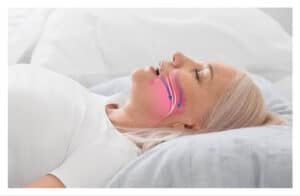What Are Risk Factors for Obstructive Sleep Apnea?

OSA affects an estimated 39 million Americans. Knowing your personal risk factors can help you determine whether you should speak to your doctor about getting screened for OSA.
Age and Anatomy Can Increase Risk
As you get older, factors like changes in your throat anatomy or decreased muscle tone can make OSA episodes more likely to occur. Men over the age of 40 and women over the age of 50 are at the highest risk of OSA, although it can affect people of any age or gender.
Your natural anatomy may also increase your chances of developing OSA regardless of age. A smaller airway, large tonsils, tongue, or uvula (the tissue hanging above your throat), or a recessed chin, neck, or jaw can make your airway more likely to collapse while sleeping.
Weight Gain Correlates with Sleep Apnea
Carrying excess body weight - especially if that additional weight is concentrated around your neck, face, and abdomen - raises your risks for OSA. Fat deposits around your upper airway can obstruct breathing, and being overweight stresses the soft tissues in your throat.
Weight loss can make a tremendous difference in OSA for overweight patients. Getting your weight fully into a healthy range often eliminates OSA symptoms entirely.
Family History Provides Clues
Like many health conditions, OSA tends to run in families. Having a first-degree relative with sleep apnea means you are significantly more likely to develop it yourself. Children of parents with OSA have a higher risk as well. Even without a family history, if you have any symptoms of OSA, including loud snoring, gasping awake at night, morning headaches, mood changes, or constant daytime sleepiness, talk to your doctor.
Getting tested and treated for sleep apnea can dramatically improve your sleep quality and daily energy levels.
A Good Night's Sleep Starts with a Screening
Diagnosing and addressing OSA is critical for protecting your short and long-term health. If frequent tiredness or other issues are affecting your quality of life, obstructive sleep apnea may be to blame.
Take our snore quiz now to find out if you may have OSA.
If you have received an OSA diagnosis and are searching for treatment, Dr. Levin specializes in sleep dentistry and can recommend a custom oral appliance to keep your airway open at night.
Contact us at eos Dental Sleep in Philadelphia, PA, at (215) 241-0700.
